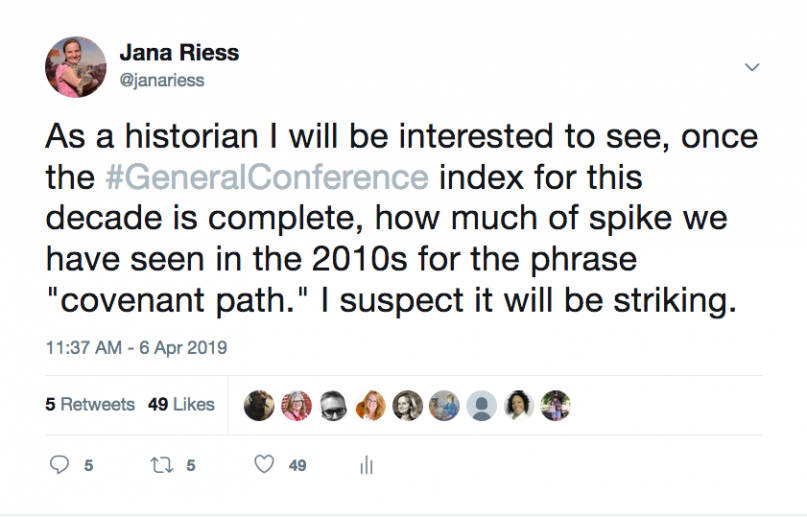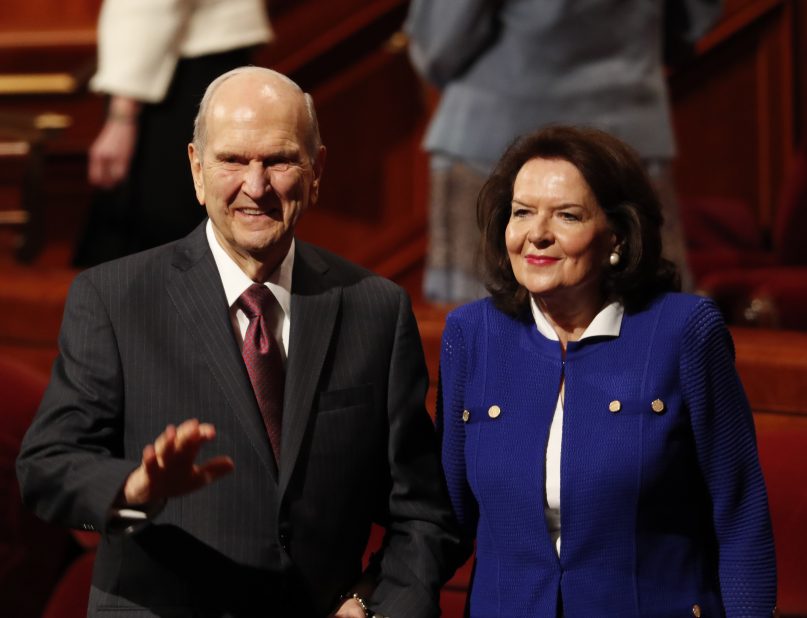(RNS) — It was a quieter, spiritually focused General Conference over the weekend for the Church of Jesus Christ of Latter-day Saints, in which leaders focused their remarks on classic topics such as faith, repentance, and families.
This was surprising to many, given that the last two General Conferences have featured major announcements (see here and here) about changes to Church policies, such as last year’s decision to shorten the three-hour “block” of Sunday meetings to two.
It was also surprising given how many rumors had been swirling around possible reforms, with some church members speculating that the Mormon dietary code would be relaxed around coffee and tea (dream on, Starbucks aficionados), or that missionary service would be shortened to 18 months for all missionaries. Neither of those came to pass.
That’s not to say that the last week hasn’t been filled with surprising Mormon news. Just prior to General Conference, the Church announced the reversal of a controversial policy regarding LGBT members and their families. At the Conference itself, however, hard news was thin on the ground.
Here are 7 main takeaways from the weekend.
- Church leaders urged Mormons to focus on developing spirituality at home. The phrase “home-centered and church-supported” appears to be the new buzzword in describing the institution’s approach to instruction at all levels. The new “Come, Follow Me” curriculum is designed for home use as well as discussion in church meetings, so some of the talks discussed ways for members to implement this approach in their lives.
- Elder Bednar may have cleared the way for greater transparency about the temple. For me, one surprise of the weekend was how specifically David Bednar’s talk dealt with what church members can and cannot disclose in regard to the temple, the holiest site for Mormon ritual life. He quoted former prophet Ezra Taft Benson in saying that some members have erred on the side of caution in discussing the temple with their children and grandchildren, saying too little for fear they might reveal too much. In essence, Bednar clarified that young people will be better prepared for the temple if parents discuss with them everything except “the special symbols associated with sacred covenants” and “the holy information that we specifically promise in the temple not to reveal.” Using screenshots of the church’s website, he showed some of the resources now available online to help members begin these conversations. I was glad to see this. One takeaway about the temple findings from the Next Mormons Survey is that there was a correlation between feeling prepared for the temple and having a positive first experience in the initiatory and endowment.
- The Church called its first African American general authority. Peter M. Johnson, an accounting professor who has taught at BYU and the University of Alabama, was called to be a Seventy. While the LDS Church has previously called men of African descent to positions of worldwide authority, Johnson is the first from the United States.
- There was, um, a 100% increase in women speakers! That’s my glass-half-full take on a perpetually dismal situation. In the October 2018 General Conference, there was only one female speaker to balance 26 male ones. This time around, there were two women and 29 men. (I think we are supposed to view that as an improvement . . . ?) As one friend on Facebook pointed out, it’s ironic that the Church keeps urging men to listen to their wives when the model it provides about the actual importance of women’s voices is for women to occupy 5% of pulpit time in Conference. On the plus side, Sister Sharon Eubank’s talk was one of the best I’ve ever heard in any General Conference, managing to be both pastoral and theologically deep.
- Several historic “pioneer temples” will be renovated. Four nineteenth-century Utah temples will undergo extensive restoration to preserve their historic character, President Russell M. Nelson announced on Sunday. Temples in St. George, Salt Lake City, Manti, and Logan are all scheduled to be renovated, then rededicated when the projects are complete. Presumably this means that each temple will be open to the public for a brief time between its renovation and rededication, which may be a first. (Historians, chime in here. Have those temples been open to the public at any point since they were first dedicated in the nineteenth century?)
- Eight new temples will be built around the globe. In the last few moments of the conference, President Nelson asked church members to remain quiet, with no “verbal outbursts” of delight or surprise, as he announced the locations for eight new temples. Six are outside the United States (Pago Pago, American Samoa; Okinawa City, Japan; Neifu, Tonga; San Pedro Sula, Honduras; Antofagasta, Chile; and Budapest, Hungary) while two will be built in the western U.S. (Tooele, Utah and Moses Lake, Washington). There are now 162 operating LDS temples around the world, with another 47 in some stage of development.
- The “covenant path” is in vogue. During Conference, as I heard the phrase “the covenant path” come up again and again from speakers, I wondered aloud on Twitter how it would be quantified compared to previous eras:

It didn’t take long for Brandt Malone of the Mormon News Report to provide me with an answer: according to the LDS Conference index, that phrase has only been uttered in Conference 61 times . . . and 58 of them have been in this decade. (And that was before this weekend.) Here’s what that looks like, long-term:

The Church’s next General Conference will take place the first weekend of October.
Previous General Conference posts:
- Why “Mormon” is now a four-letter word, and other General Conference takeaways (October 2018)
- Changes for Mormons: 12 takeaways from LDS General Conference (April 2018)
- Mormons get two new apostles who are not white Americans, in historic LDS General Conference (April 2018)






